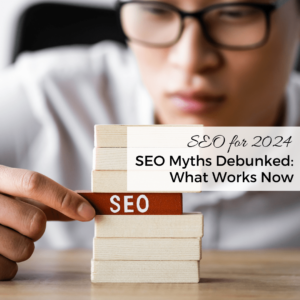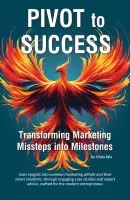- +1 512-591-8295
- [email protected]
- Mon - Fri: 9:00 - 16:00

Are you tired of chasing after SEO trends that don’t deliver results? In the fast-paced world of digital marketing, it’s easy to get caught up in myths and misconceptions. Let’s cut through the noise. This article isn’t just about debunking outdated SEO myths; it’s about equipping you with the strategies that truly work in 2024. Get ready to uncover the secrets of effective SEO and transform your online presence.
The past few years have seen SEO marked by significant technological advances, especially in AI and machine learning. Even before any of the search engines began integrated AI into their results, we had seen major changes to the algorithm. Google had so many major updates to their algorithm in 2023 that it was hard to even keep up.
These innovations have fundamentally transformed how search engines, particularly Google, understand and rank content.
Since 2018, Google has rolled out a series of major updates, each reshaping the SEO landscape. From the BERT update, enhancing the understanding of natural language in search queries, to the Core Updates that periodically refine Google’s algorithms, the evolution has been rapid and transformative. These changes require a strategic shift in SEO practices, pushing us to adapt and innovate continually.
Parallel to these technological shifts, there’s been an increasing emphasis on user experience (UX) in SEO.
Google’s updates, like the Mobile-First Indexing and the Page Experience update, have made it clear that UX is a top priority.
Websites that offer a seamless, engaging, and user-friendly experience are now favored in search rankings. This shift underscores the importance of aligning SEO strategies not just with technical optimization but also with delivering a superior user experience.
Recently, the introduction of Search Generative Experience (SGE) has signaled another significant shift. SGE’s capabilities suggest a future where users get more direct answers within search results, potentially reducing the number of clicks to websites.
While the full impact of SGE on SEO practices is still unfolding, one thing is clear: the need for high-quality, authoritative content is more crucial than ever. As search engines evolve to provide more direct answers, the focus for businesses should be on establishing themselves as credible sources of information, anticipating user queries, and providing valuable insights directly within their content.
While it’s true that keywords are essential for SEO, overusing them – a practice known as keyword stuffing – can backfire. This is an old, bad practice that can actually get your site dinged.
Previously, when researching keywords, we were looking at terms that contained two, or at most three words. It’s a better practice now to focus on longtail keywords, and phrases that use natural language.
There’s also less importance about how many and where keywords appear. You don’t need to be as concerned with where a word appears in a title, if it’s in every heading, meta tags have been out for a long time. We focus primarily on using words when and where the audience would find them useful. Search engines have evolved to prioritize content that provides real value to the reader, focusing on quality, relevance, and context over mere keyword density.
Contrary to the belief that SEO is a set-and-forget task, it requires ongoing attention and adaptation. As search engine algorithms evolve (constantly!), regular updates to your SEO strategy are necessary to maintain and improve your results.
If it were only a one-time task, you would never need me. For that matter, I would never need me. It would make all of our websites SO much easier.
Social media’s role in SEO is often underestimated. While it may not directly influence rankings, it can significantly impact SEO by driving traffic, enhancing online visibility, and contributing to your brand’s overall digital presence. Most of the major search engines do pay attention to traffic coming from social platforms.
Expecting quick results from SEO efforts is a common misconception.
SEO is a long-term strategy, and its success depends on consistent efforts over time. Patience and persistence are key to seeing the desired outcomes.
There are some times that we can greatly help a client move the SEO needle in a relatively short amount of time, but that’s often by fixing some critical technical issues. Everything else is a long game.
How Holistic SEO Services are Helping This Business – Quick Case Study
In 2024, your content creation needs to focus on quality. This approach goes beyond just filling pages with words and making sure they’re grammatically perfect (I would even say that they need to be authentic and helpful). It’s about crafting content that truly resonates with your audience.
Each piece should inform, engage, and add value, addressing the needs and questions of your readers. It’s not just about incorporating keywords; it’s about weaving them seamlessly into content that answers the very queries your audience might have.
At Vicky Wu Marketing, our audience-first approach ensures that content is not only SEO-friendly but also genuinely useful and engaging, setting a solid foundation for long-term digital success.
It’s a mobile world. Even in seemingly third-world countries, most people have a mobile phone. With mobile internet usage consistently outpacing desktop, optimizing for mobile isn’t just an option – it’s a necessity.
Mobile-first indexing signifies that Google predominantly uses the mobile version of the content for indexing and ranking. This change reflects the way users predominantly access the internet today.
Websites must be responsive, load quickly on mobile devices, and offer an intuitive user experience. It’s about meeting your audience where they are – on their phones, searching for information or services that you provide.
As voice search becomes increasingly popular, optimizing content for this newer mode of search is crucial. The key lies in understanding how people naturally speak and query information through voice assistants.
This means shifting to a more conversational tone and focusing on long-tail keywords that mirror spoken language. It’s about anticipating the questions your audience might ask out loud and crafting content that directly answers these queries.
Sometimes, it can also mean making sure your business can be found when using mobile devices (for example, you can tell Alexa ‘play Your Marketing Department on Apple Podcasts’ and you’ll get one of our most recent podcast episodes!)
At Vicky Wu Marketing, we ensure that our content is as voice search-friendly as it is readable, keeping it one step ahead in the evolving SEO game.
Local SEO continues to be a cornerstone for businesses targeting specific geographic areas. It’s about making your business visible and easily discoverable in local searches – a crucial factor for companies that rely on a local clientele.
This used to mean Google Business profile, yet now also making sure your Google Knowledge Panel has been claimed is critical.
This involves optimizing your online presence for location-specific searches, making sure your business shows up in places like Apple maps, Yelp, Google Maps; ensuring your business shows up in local directories, and maintaining consistent NAP (Name, Address, Phone Number) information across platforms.
By focusing on local SEO, businesses connect with their community, enhancing their local visibility and relevance.
Local SEO Strategies for Small Businesses
At the core of all these strategies lies our unwavering commitment to an audience-first approach. We always prioritize what’s best for the audience in every aspect of SEO – from keyword placement to writing excerpts.
This strategy has proven its worth for all of our SEO clients through every major change in the SEO landscape, even those that have negatively impacted many businesses.
By focusing on the audience’s needs and preferences, we’ve helped businesses not just survive but thrive amidst the continual evolution of SEO.
When you’re diving into the world of online marketing and search engine optimization (SEO), one of the first and most crucial steps is understanding your target market. Whether your focus is business-to-professional (B2P), business-to-consumer (B2C), or business-to-business (B2B), this knowledge forms the foundation of your SEO strategy.
Identifying Your Audience: Begin by identifying who your ideal customer is. Consider factors like age, location, profession, and interests. This is about more than just demographics; it’s about psychographics too. Understanding the motivations, pain points, and aspirations of your audience is key.
Tailoring Your SEO Strategy: Once you’ve identified your audience, it’s time to tailor your SEO strategy to meet their specific needs and preferences. This involves researching the keywords they use, the type of content they consume, and the online platforms they frequent. If your target market is other businesses (B2B), your approach will differ significantly from a consumer-focused (B2C) strategy.
Leveraging Analytics: Use analytics tools to gather data on your audience’s online behavior. This will help you refine your strategy over time, ensuring that you’re always aligning with their evolving needs and preferences.
In the ever-evolving landscape of SEO, staying ahead of the curve is vital. Modern SEO is not just about keywords and backlinks; it’s about understanding and leveraging the latest techniques and technologies.
Embracing SGE Strategies for AI Search Optimization: Search Generation Engines (SGE) and AI Search Optimization are at the forefront of modern SEO. These technologies go beyond traditional search algorithms, taking into account user intent and contextual relevance. Implementing SGE strategies can help your website appear more prominently in AI-driven search results.
Conducting Regular Website Audits: Regular website audits are crucial. They help identify issues such as broken links, slow loading times, and outdated content, which can negatively impact your SEO. Use tools like Google Analytics and SEMrush for comprehensive site audits.
Updating Content Regularly: Content is king in the world of SEO. Regularly updating your website with fresh, relevant content keeps it interesting for your audience and search engines. This includes updating old blog posts, adding new articles, and ensuring that all content is SEO-optimized.
A strong online presence is more than just having a website; it’s about creating a digital footprint that resonates with your target audience and builds credibility.
Quality Content Creation: Creating quality content is at the heart of a strong online presence. This means producing material that is informative, engaging, and valuable to your audience. Content should not only be well-written but also optimized for search engines with relevant keywords and phrases.
Developing a Strong Backlink Profile: Backlinks, links from other websites to yours, are a critical component of SEO. They act as endorsements, signaling to search engines that your content is valuable. Focus on building a strong backlink profile through guest blogging, collaborations, and creating shareable content.
Engaging with Your Audience: Consistent engagement with your audience is essential. This can be through social media, responding to comments on your blog, or through email newsletters. Engagement helps build a community around your brand, fosters loyalty, and enhances your SEO efforts through increased traffic and interaction.
Customized Solutions for Diverse Needs
At Vicky Wu Marketing, we understand that each business is unique. We develop customized SEO strategies that align with your specific business goals and audience.
Success Stories and Case Studies
Our approach is backed by real-world results. We share case studies and success stories demonstrating how our tailored strategies have driven growth and success for our clients.
How Holistic SEO Services are Helping This Business: Quick Case Study
Case Study: Search Engine Optimization [SEO]
Marketing Case Study – SEO Gone Wrong
Understanding and adapting to the current SEO landscape is vital for online success. This guide debunks common myths and provides effective strategies to help you navigate SEO in 2024.
Curious how you can increase your website traffic?
Get solid marketing strategies, designed for entrepreneurs on the track to 7-figures and beyond, right in your inbox.

This website uses cookies to ensure you get the best experience on our website. By continuing to use the website, you agree to our use of cookies. We do not share or sell your information. More info
